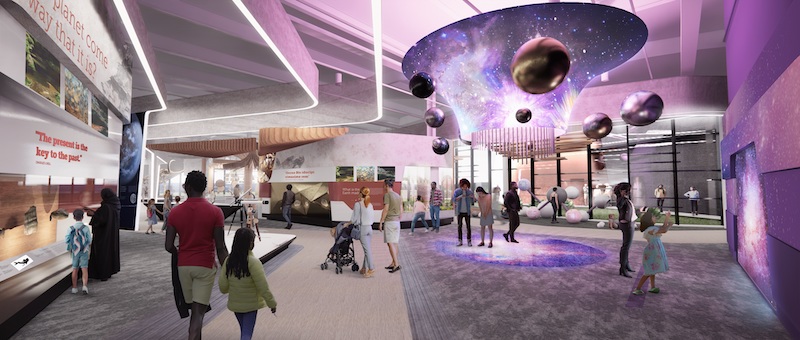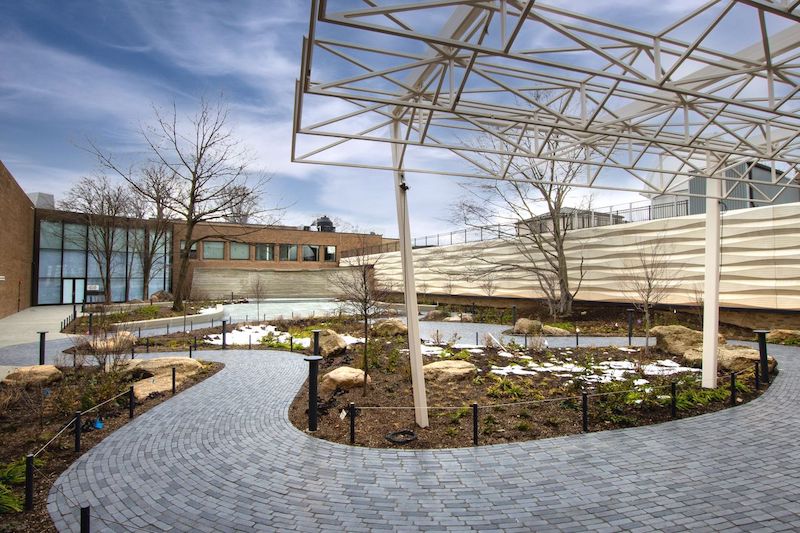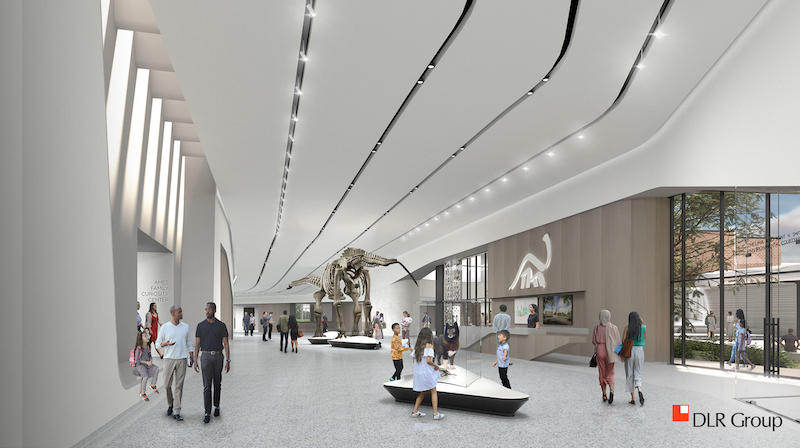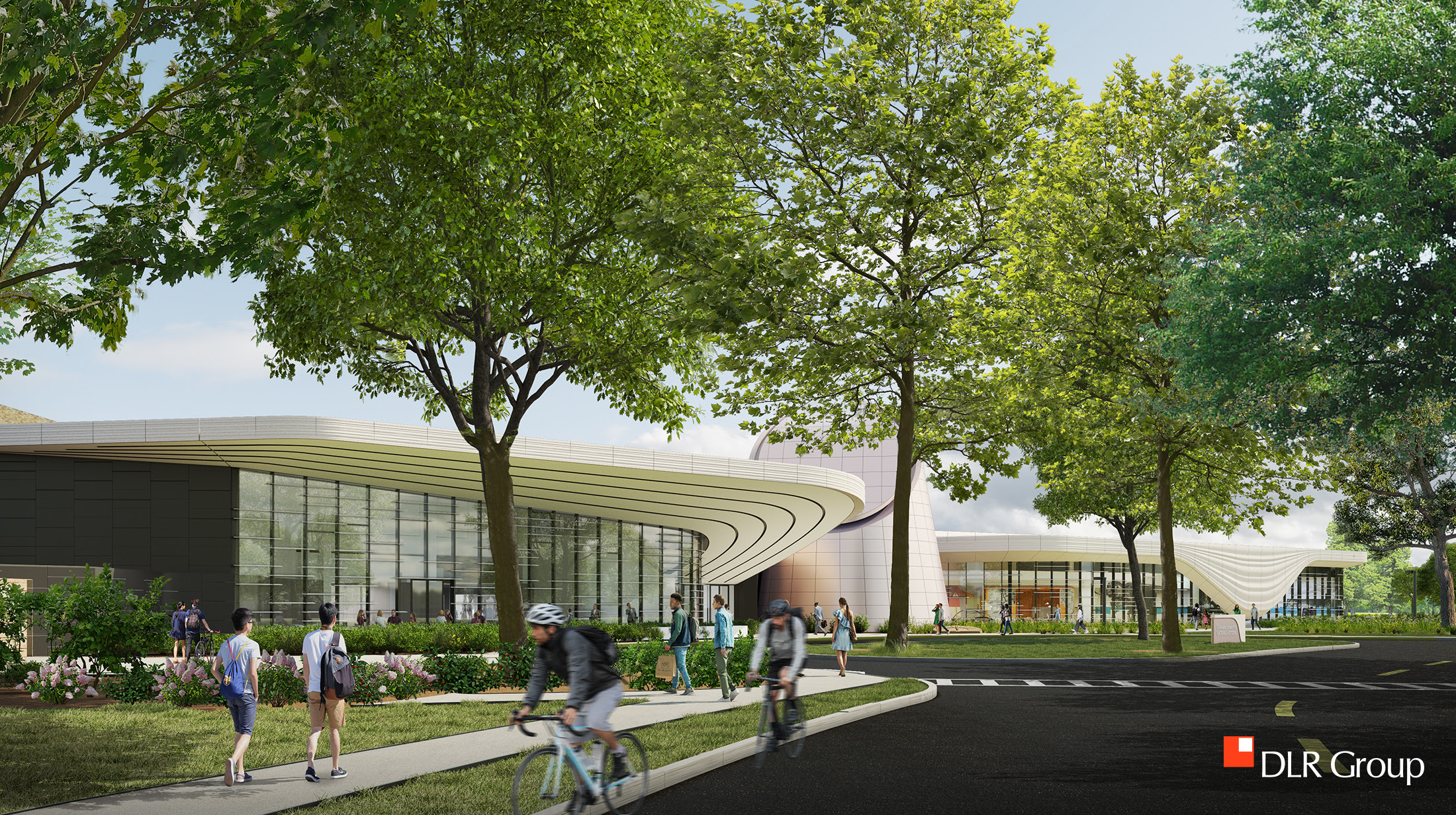Last December, the 100-year-old Cleveland Museum of Natural History completed an $8.9 million overhaul of its Thelma and Kent H. Smith Environmental Courtyard and the upgrade of its 450-seat Murch Auditorium. The courtyard was one of several “gateway” projects that have been interim stages of a $150 million expansion and renovation of the Museum, whose new 50,000-sf Exhibit Hall, main lobby, and café are scheduled to break ground this Thursday.
Sonia Winner, the Museum’s President and CEO, told the Cleveland Plain Dealer that the institution was also planning an $11.4 million upgrade of its central utility plant.
Since 1958, when the Museum moved to its current location, it has expanded at least six times. The latest expansion, designed by DLR Group, will feature a curving, snow-white roof made from cast-concrete panels and intended to evoke the glacier that covered Northeast Ohio during the last ice age. (Panzica Construction is the GC on this project.)
The museum’s latest expansion and renovation will create new exhibits, developed by Gallagher & Associates, and add curatorial posts for the purposes of connecting, in new ways, the Museum’s collections and research with public education and programming.

A rendering of the Museum's Planetary Process Gallery. The Museum's exhibit reorganization will attempt to connect humanity to the larger universe. Image: Gallagher & Associates
RETELLING HISTORY’S MARCH
The museum, which pre-pandemic was drawing 260,000 visitors annually, holds more than five million artifacts and specimens, and, through its Natural Areas program, stewards more than 11,000 acres of nature preserve in Northeast Ohio. Massive new exterior glass walls will wrap around the addition’s façade to open sightlines between the exhibits and the surrounding landscape of Wade Oval.
Inside, the traditional museum organization—by time period, geography, and species—is being deconstructed to tell integrated stories of planetary and biological processes.
The goal of this “reinvention” is to show more clearly how humanity intersects with the continuum of life on Earth and universal forces.
“We are creating a new model for natural history museums that uses the past to inform our present to build a better future together,” explains Winner. “Our reimagined museum will illuminate the interconnectedness of human life and the natural world, and how science is essential to our lives.”

An “environmental courtyard,” which received an $8.9 million makeover, now serves as one of the Museum's gateways. Image: Cleveland Museum of Natural History
EVOLUTION ON DISPLAY
The museum addition (parts of which are scheduled to open next year) is being constructed on what currently is a parking lot, and will include a central welcome and orientation area, another gateway. The new Visitors Hall will feature a reconstruction of “Lucy,” the 3.2-million-year-old human ancestor that a team of Cleveland museum scientists first discovered 45 years ago, as well as a geological sample collected from the Moon, and specimens of modern-day animals to illustrate evolutionary and biological changes.
A new self-guided interactive space, The Ames Family Curiosity Center, is meant to connect the museum’s collections with its visitors’ lived experiences and global science-related news.
The addition and renovation should be completed sometime in 2024.

Each of the Museum's exhibitions will be part of a larger evolutionary story. Image: DLR Group
Related Stories
| Aug 11, 2010
Museum celebrates African-American heritage
The Harvey B. Gantt Center for African-American Arts + Culture recently completed construction on the Wells Fargo Cultural Campus in Charlotte, N.C. Designed by the Freelon Group, Durham, N.C., with Batson-Cook's Atlanta office as project manager, the $18.8 million project achieved nearly 100% minority participation.
| Aug 11, 2010
Design for Miami Art Museum triples gallery space
Herzog & de Meuron has completed design development for the Miami Art Museum’s new complex, which will anchor the city’s 29-acre Museum Park, overlooking Biscayne Bay. At 120,000 sf with 32,000 sf of gallery space, the three-story museum will be three times larger than the current facility.
| Aug 11, 2010
Thom Mayne unveils ‘floating cube’ design for the Perot Museum of Nature and Science
Calling it a “living educational tool featuring architecture inspired by nature and science,” Pritzker Prize Laureate Thom Mayne unveiled the schematic designs and building model for the Perot Museum of Nature & Science at Victory Park in Dallas. The $185 million, 180,000-sf structure is 170 feet tall—equivalent to approximately 14 stories—and is conceived as a large...
| Aug 11, 2010
Piano's 'Flying Carpet'
Italian architect Renzo Piano refers to his $294 million, 264,000-sf Modern Wing of the Art Institute of Chicago as a “temple of light.” That's all well and good, but how did Piano and the engineers from London-based Arup create an almost entirely naturally lit interior while still protecting the priceless works of art in the Institute's third-floor galleries from dangerous ultravio...
| Aug 11, 2010
The Art of Reconstruction
The Old Patent Office Building in Washington, D.C., completed in 1867, houses two Smithsonian Institution museums—the National Portrait Gallery and the American Art Museum. Collections include portraits of all U.S. presidents, along with paintings, sculptures, prints, and drawings of numerous historic figures from American history, and the works of more than 7,000 American artists.
| Aug 11, 2010
Silver Award: Please Touch Museum at Memorial Hall Philadelphia, Pa.
Built in 1875 to serve as the art gallery for the Centennial International Exhibition in Fairmount Park, Memorial Hall stands as one of the great civic structures in Philadelphia. The neoclassical building, designed by Fairmount Park Commission engineer Hermann J. Schwarzmann, was one of the first buildings in America to be designed according to the principles of the Beaux Arts movement.







